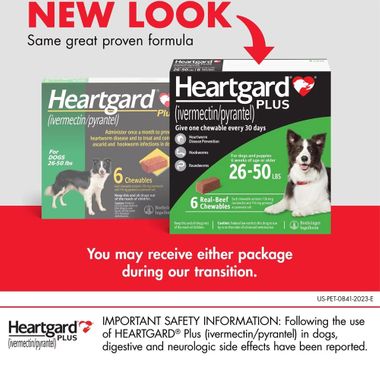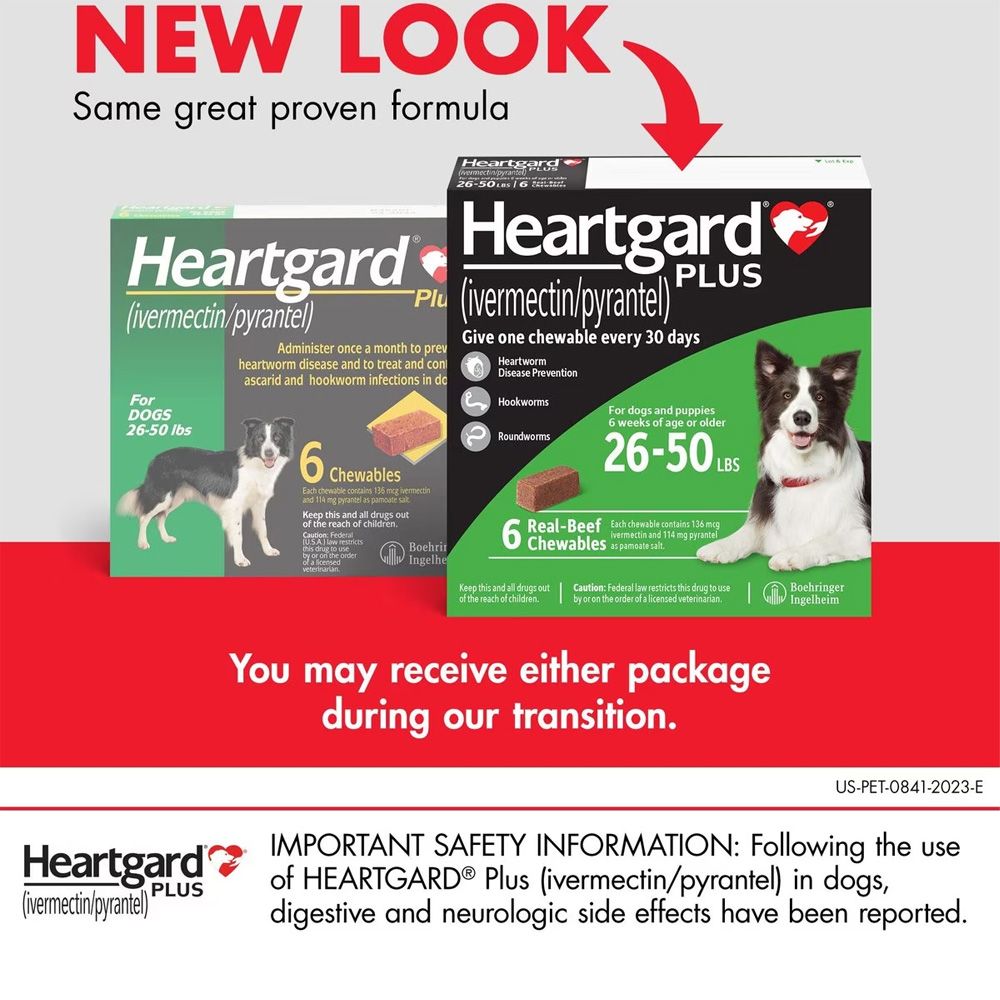SAVE 17% OFF 17% OFF Use Code LUCKY17 *
Heartgard Plus for Dogs - ivermectin|pyrantel- 26-50 lbs (6 Chews) - [Heartworm Prevention]
- Notice
- Description
- Ingredients
- Directions
- FAQ
- Reviews
Notices
HEARTGARD ON SALE! Discounted price can be seen in cart.
Description
Heartgard Plus Chew is a trusted veterinary medication specifically designed for the monthly prevention of heartworm disease in dogs. This palatable chewable tablet combines two powerful active ingredients – ivermectin and pyrantel – to provide comprehensive protection against heartworms while also treating and controlling common intestinal parasites like roundworms and hookworms. Its easy oral administration makes monthly protection convenient for pet owners.
Key Benefits of Heartgard Plus Chew:
- Effective Heartworm Prevention: Safeguards your dog against potentially life-threatening heartworm disease.
- Treats and Controls Roundworms: Eliminates and prevents roundworm infestations.
- Treats and Controls Hookworms: Effectively manages hookworm infections in dogs.
- Palatable Chewable Tablet: Most dogs readily accept the tasty chew, making monthly dosing stress-free.
- Once-a-Month Convenience: Just one chew per month provides continuous protection.
- Formulated for Dogs: Specifically developed and safe for use in dogs.
- Prescription Medication: Requires a prescription from your veterinarian, ensuring safe and appropriate use.
Indications:
Heartgard Plus Chew is indicated for the prevention of heartworm disease in dogs by eliminating the immature (larval) stages of heartworms transmitted through mosquito bites. Consistent monthly administration is crucial for year-round protection, especially during mosquito season.
Heartworm disease can cause severe and potentially fatal damage to a dog's heart, lungs, and blood vessels. Prevention with Heartgard Plus is a safer and more cost-effective approach than treating an existing infection.
In addition to heartworm prevention, Heartgard Plus also contains pyrantel, which effectively treats and controls common intestinal parasites such as roundworms and hookworms, contributing to your dog's overall health and well-being.
Important Note: Heartgard Plus is specifically formulated for dogs and should only be used as prescribed by a veterinarian. Consult your vet for the correct dosage based on your dog's weight and health status.
How Heartgard Plus Works:
Active Ingredients:
- Ivermectin: This key ingredient targets and eliminates the larval stages of heartworms. By interfering with their nerve impulses, ivermectin paralyzes and kills the larvae, preventing them from maturing into harmful adult heartworms.
- Pyrantel: This deworming agent is effective against common intestinal parasites, specifically roundworms and hookworms. Pyrantel works by paralyzing these worms, allowing them to be naturally expelled from the dog's system.
Monthly Administration for Continuous Protection:
Heartgard Plus Chew is designed for convenient once-a-month oral administration. Its palatable formulation makes it easy to give to your dog, ensuring consistent protection against heartworms and intestinal worms throughout the year. Year-round administration is recommended to protect your dog even during off-seasons when mosquitoes may still be present.
Ingredients
| Active Ingredient | Heartgard Blue | Heartgard Green | Heartgard Brown |
|---|---|---|---|
| Ivermectin | 68 mcg | 136 mcg | 272 mcg |
| Pyrantel | 57 mg | 114 mg | 227 mg |
Directions
Heartgard Plus should be administered orally at monthly intervals at the recommended minimum dose level of 6 mcg of ivermectin per kilogram (2.72 mcg/lb) and 5 mg of pyrantel (as pamoate salt) per kg (2.27 mg/lb) of body weight. The following table outlines the recommended dosing schedule for the prevention of canine heartworm disease and for the treatment and control of ascarids and hookworms:
Heartgard Plus Dosage Chart:
| Dog Weight | Chewables Per Month | Ivermectin Content | Pyrantel Content | Color Coding |
|---|---|---|---|---|
| Up to 25 lb | 1 | 68 mcg | 57 mg | Blue |
| 26-50 lbs | 1 | 136 mcg | 114 mg | Green |
| 51-100 lbs | 1 | 272 mcg | 227 mg | Brown |
| Over 100 lbs | Use the appropriate combination of these chewables. | |||
Heartgard Plus is recommended for dogs 6 weeks of age and older.
Quick Tips for Administering Heartgard Plus:
- Give Heartgard Plus Chewables once a month, ideally on the same day each month, year-round.
- Heartgard Plus Chewables are specifically for dogs.
- The chewables should be chewed by the dog, not swallowed whole.
- Chewables can be broken into pieces or crumbled and mixed with a small amount of food if needed.
- Observe your dog closely after dosing to ensure the entire chewable has been swallowed. If not fully consumed, administer another full recommended dose as soon as possible.
- Keep the chewable in its wrapper until you are ready to give it to your pet to protect it from light.
Administration Instructions:
Remove only one chewable at a time from the foil-backed blister card. Return the remaining chewables to its box to protect the product from light. Because most dogs find Heartgard Plus palatable, the product can be offered to the dog by hand. Alternatively, it may be added intact to a small amount of dog food. The chewable should be administered in a manner that encourages the dog to chew, rather than to swallow without chewing. Chewables may be broken into pieces and fed to dogs that normally swallow treats whole.
Ensure your dog consumes the complete dose. Observe your dog for a few minutes after administration to make sure none of the dose is lost or rejected. If it is suspected that any of the dose has been lost, redosing is recommended.
Heartgard Plus should be given at monthly intervals during the period of the year when mosquitoes (vectors), potentially carrying infective heartworm larvae, are active. The initial dose must be given within a month (30 days) after the dog's first exposure to mosquitoes. The final dose must be given within a month (30 days) after the dog's last exposure to mosquitoes.
When replacing another heartworm preventive product in a heartworm disease preventive program, the first dose of Heartgard Plus must be given within a month (30 days) of the last dose of the former medication.
If the interval between doses exceeds a month (30 days), the efficacy of ivermectin can be reduced. Therefore, for optimal performance, the chewable must be given once a month on or about the same day of the month. If treatment is delayed, whether by a few days or many, immediate treatment with Heartgard Plus and resumption of the recommended dosing regimen minimizes the opportunity for the development of adult heartworms.
Monthly treatment with Heartgard Plus also effectively treats and controls ascarids (T. canis, T. leonina)and hookworms (A. caninum, U. stenocephala, A. braziliense) . Clients should be advised of measures to be taken to prevent reinfection with intestinal parasites.
Federal (U.S.A.) law restricts this drug to use by or on the order of a licensed veterinarian.
Acceptability:
Clinical trials have shown that Heartgard Plus chewables are readily accepted by most dogs when offered orally.
Precautions:
All dogs should be tested for existing heartworm infection before starting treatment with Heartgard Plus which is not effective against adult D. immitis. Infected dogs must be treated to remove adult heartworms and microfilariae before initiating a program with Heartgard Plus.
While some microfilariae may be killed by the ivermectin in Heartgard Plus at the recommended dose level, Heartgard Plus is not effective for microfilariae clearance. A mild hypersensitivity-type reaction, presumably due to dead or dying microfilariae and particularly involving a transient diarrhea, has been observed in clinical trials with ivermectin alone after treatment of some dogs that have circulating microfilariae.
Store Heartgard Plus between 68°- 77°F (20°- 25°C). Excursions between 59° - 86°F (15° - 30°C) are permitted. Protect product from light.
Adverse Reactions:
Vomiting or diarrhea within 24 hours of dosing was rarely observed in clinical trials. The following adverse reactions have been reported: Depression/lethargy, vomiting, anorexia, diarrhea, mydriasis, ataxia, staggering, convulsions and hypersalivation.
Safety:
Heartgard Plus has been shown to be bioequivalent to Heartgard, with respect to the bioavailability of ivermectin. The dose regimens of Heartgard Plus and Heartgard are the same with regard to ivermectin (6 mcg/kg). Studies with ivermectin indicate that certain dogs of the Collie breed are more sensitive to the effects of ivermectin administered at elevated dose levels (more than 16 times the target use level) than dogs of other breeds. At elevated doses, sensitive dogs showed adverse reactions which included mydriasis, depression/lethargy, anorexia, mydriasis, ataxia, staggering, convulsions and hypersalivation.
Heartgard Plus has a wide margin of safety at the recommended dose level in dogs, including pregnant or breeding females, stud dogs and puppies aged 6 or more weeks. In clinical trials, many commonly used flea collars, dips, shampoos, anthelmintics, antibiotics, vaccines and steroid preparations have been administered with Heartgard Plus in a heartworm disease preventive program.
Possible Side Effects:
In clinical field trials with Heartgard Plus, vomiting or diarrhea within 24 hours of dosing was rarely observed (1.1% of administered doses). Other reported adverse reactions include depression/lethargy, anorexia, mydriasis, ataxia, staggering, convulsions and hypersalivation.
FAQ
Reviews
- Good prices and services and large quantities of animal medicines.
- Dogs love it.
- N/A
- Price; good and fast service.
- None so far.
- see above
- see above
- sizing is for up to 25 for the smallest
- Order was completed fast as it was a prescription order.
- Took about a little over a week to receive. Might be because it came from the west coast and went to the east coast. If you are short on time, this was a close call.
- Price seemed very good, but when my order was filled I was billed a different price
- Easy to order with no hassel
- None
- Great for tiny dogs
- Need to purchase this ongoingly
- Taste





























![Heartgard Plus for Dogs - ivermectin|pyrantel- 26-50 lbs (6 Chews) - [Heartworm Prevention] Video](https://img.youtube.com/vi/R-66bdL6sjs/0.jpg)